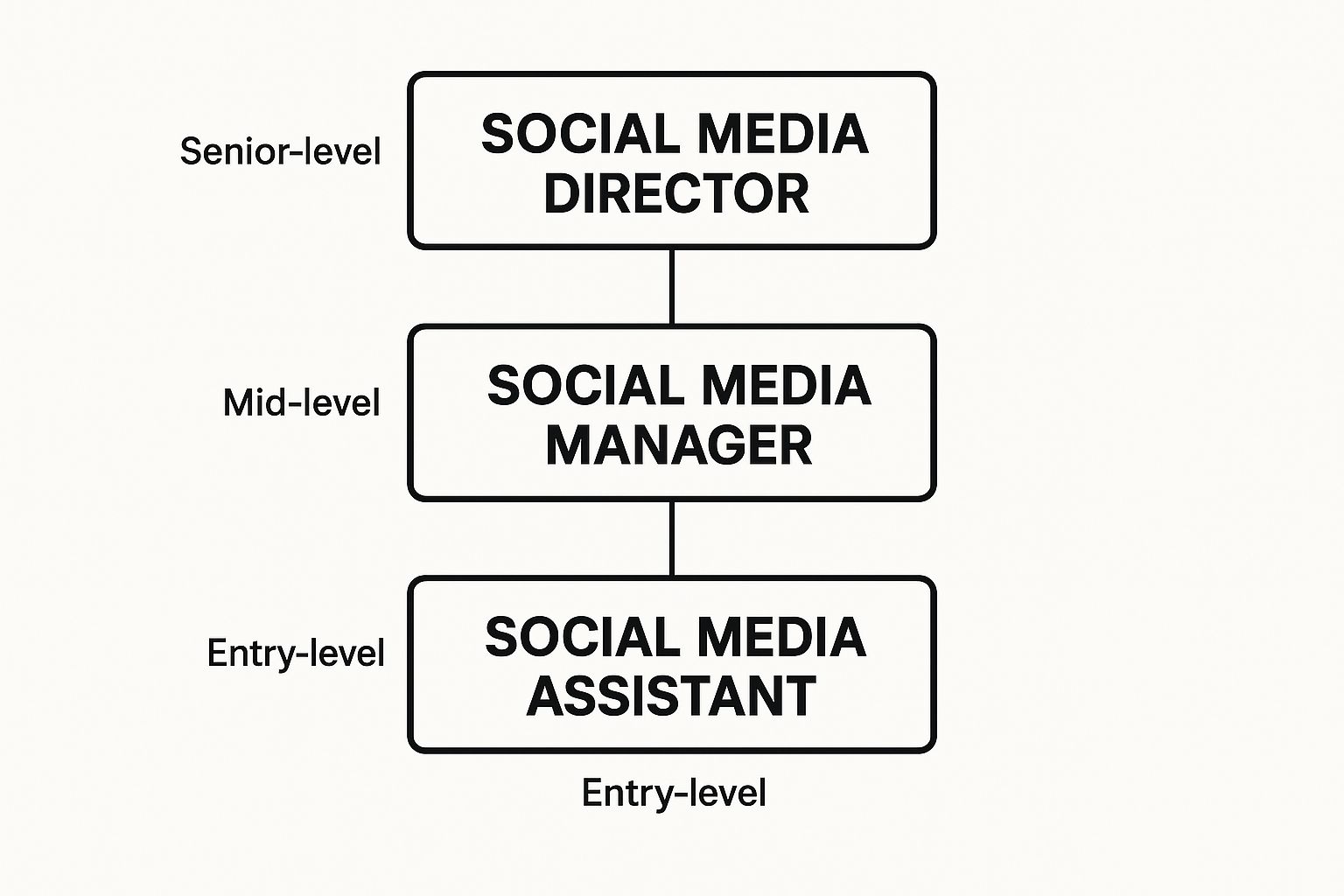
Your Guide to Jobs in Social Media Marketing
Published
Let's get one thing straight: a career in social media is so much more than just posting online. It’s a fascinating field that sits at the intersection of creativity and hard data, where professionals are tasked with building and nurturing entire digital communities. The demand for people who can do this well is skyrocketing, making jobs in social media marketing some of the hottest and most essential roles in the business world today.
The Exploding World of Social Media Careers

Thinking a social media job is just about tweeting or posting Instagram stories is like saying an architect just stacks bricks. It misses the whole picture. In reality, a social media professional is the architect, the mayor, and the data scientist of a brand's digital city. They're the ones who design the layout (content strategy), manage the population (community engagement), and analyze the traffic patterns (analytics) to make sure that city doesn't just survive, but thrives.
And this digital world is growing at an incredible pace. The number of people on social platforms is already massive and continues to climb, creating a colossal audience for businesses to connect with. This growth is precisely what's fueling the demand for pros who can skillfully navigate this complex and ever-changing environment.
From Niche to Necessity
It wasn't that long ago that having a dedicated social media person on staff was a luxury, something only huge corporations could afford. Now, it's a core necessity for businesses of all shapes and sizes, from the corner coffee shop to global tech giants. What caused this massive shift? Social media stopped being a simple bulletin board for company news and became a central hub for everything.
Today, it's a primary channel for:
- Customer Service: Answering questions and handling feedback in real time.
- Brand Building: Creating a distinct voice and personality that people actually connect with.
- Lead Generation: Guiding followers on the path to becoming paying customers.
- Market Research: Tapping into conversations to get a real pulse on what consumers want.
This makes the role incredibly multi-faceted. To succeed, you need to be just as comfortable digging into engagement metrics as you are writing a clever caption or designing a thumb-stopping graphic.
A career in social media marketing is about turning online engagement into real, tangible business results. It’s the art and science of building relationships at scale—using creativity to capture attention and data to prove it was all worth it.
The Numbers Behind the Demand
The sheer scale of social media usage is what really drives home why these jobs are so critical. By 2025, the global user base is expected to hit nearly 5.45 billion people, which is a staggering 67.1% of the world's population. On average, people spend 2 hours and 24 minutes a day on these platforms, jumping between about seven different networks each month. This enormous, highly active audience is a massive opportunity, but it's also a serious challenge that requires dedicated expertise to manage effectively. You can dig deeper into these game-changing social media statistics on Sonary.com.
Ultimately, the boom in jobs in social media marketing is a direct response to this reality. Companies need experts who not only speak the unique language of each platform but can also translate that digital fluency into measurable success. This guide is here to walk you through the specific roles, skills, and strategies you'll need to build a rewarding career in this exciting field.
Charting Your Social Media Career Path
Thinking about a career in social media? It’s less of a straight ladder and more of a "choose your own adventure" game. The path you take is shaped by your unique skills and interests, unlocking different specializations and leadership roles along the way. The biggest shift you'll see is moving from hands-on, day-to-day work to big-picture, strategic planning. Understanding this journey is the first step to plotting your own course and hitting the milestones you need to grow.
Most people get their start in jobs in social media marketing with a role that's all about "doing." You'll be the one on the front lines—crafting content, scheduling posts, and chatting directly with the online community. This is where you build your foundation, learning the ins and outs of each platform and getting a real gut feeling for what an audience loves.
Once you’ve got some experience under your belt, your perspective starts to broaden. You’ll find yourself moving from just doing the tasks to analyzing why they work. Instead of simply posting content, you'll start asking the important questions: "Why did this Reel get so much more engagement?" or "Are we posting when our audience is actually online?" This curiosity is what kicks off your climb to the next level.
From Tactical Execution to Strategic Oversight
The real difference between an entry-level pro and a mid-level manager is the leap from managing tasks to owning the strategy. A coordinator is great at following the content calendar. A manager helps create it. They start thinking bigger, figuring out how social media can actually drive business goals, whether that’s bringing in new leads or making the brand a household name.
This image here does a great job of showing how the roles stack up and how your responsibilities grow at each stage.

As you can see, the journey from an assistant to a director is all about expanding your influence—from daily posts, to running full campaigns, and eventually, to leading an entire department.
The higher you climb, the less you'll be involved in the day-to-day posting. Your time will be spent on things with a much bigger impact, like managing budgets, guiding your team, and proving to the higher-ups how social media is paying off. Senior leaders don’t just run campaigns; they build the entire system that makes those campaigns successful.
Think of it this way: your career progression in social media is about moving from being a star player on the field to becoming the coach who designs the winning plays. Your value shifts from executing a perfect post to building a winning team and a killer strategy.
Mapping Your Advancement
To help you visualize this journey, here’s a breakdown of the typical social media marketing career ladder. It outlines the common roles at each level, what they focus on, and the experience you'll generally need to land them.
Typical Social Media Marketing Career Progression
| Career Level | Common Job Titles | Primary Focus | Typical Experience |
|---|---|---|---|
| Entry-Level | Social Media Coordinator, Assistant, Community Manager | Daily execution, content scheduling, community engagement | 0-2 years |
| Mid-Level | Social Media Manager, Strategist, Specialist | Campaign planning, content strategy, performance analysis | 3-5 years |
| Senior-Level | Senior Social Media Manager, Head of Social Media | Team leadership, budget management, cross-functional strategy | 5-8 years |
| Leadership | Director of Social Media, VP of Marketing | Departmental oversight, long-term vision, ROI reporting | 8+ years |
This table provides a great road map, but remember, getting promoted isn't just about putting in the time. It’s about proving you have the skills for what’s next. Excelling where you are is the price of admission, but showing you’re ready for the next challenge is what gets you through the door.
Here’s how to make the leap from an entry-level to a mid-level role:
- Sharpen Your Analytical Skills: Don't just report on likes and shares. Dive deeper and connect your social media data to real business results, like website traffic or new customer sign-ups.
- Take Initiative: Don’t wait to be told what to do. Pitch a new content series, suggest an A/B test for your captions, or spot an emerging trend the brand can jump on before anyone else.
- Become a Project Management Pro: Show you can run a small campaign from start to finish. This means coordinating with designers, writers, and other teams to get it across the finish line smoothly.
Getting to a senior-level position, like a Social Media Director, requires another big shift in your thinking. You’ll need to develop a rock-solid strategic mind. For a more detailed look at this advanced journey, our guide on the complete social media marketing career path has some fantastic insights. These top-tier roles are all about leadership, managing money wisely, and working with other departments. Your success isn't just measured by one channel's performance, but by how much social media contributes to the company's overall success.
So, you're eyeing a career in social media marketing? Great choice. It's a field that's not just growing—it's exploding. But what exactly does a career path in social media look like, and what kind of salary can you expect? Let's break it down.
The world of social media marketing is incredibly diverse. You can find yourself working in-house for a single brand, juggling multiple clients at an agency, or even striking out on your own as a freelancer. Each path offers a unique set of challenges and rewards.

What Do Social Media Marketing Professionals Earn?
Let's talk numbers. The salary for a social media marketing pro can vary wildly based on your experience, the company's size, and where you're located. To give you a clearer picture, we've pulled together some data.
According to research, the average salary for a social media manager in the United States sits around $73,000 per year. But that's just an average. The range can be quite wide, typically falling between $50,000 and $100,000 annually.
Here’s a quick look at how salaries can differ by role:
- Social Media Specialist: Think of this as an entry-level to mid-level role. You're in the trenches, executing the strategy. The average salary here is about $60,000 per year.
- Social Media Strategist: This is a more senior role. You're the brain behind the campaigns, figuring out the why and the how. Strategists often earn around $80,000 annually.
- Social Media Director: At the top of the ladder, you're leading the entire social media department. Directors can command salaries upwards of $110,000 per year, sometimes much more at larger corporations.
It's also worth noting that the rise of remote work has opened up a global talent pool. Companies are increasingly Hiring Remote Social Media Managers from different regions, which can also influence salary expectations. For instance, a manager based in a lower cost-of-living area might have a different salary range than one in New York or San Francisco, even when working for the same company.
Building Your Essential Social Media Skillset

In the world of social media, your skills are your currency. A genuine passion for the platforms is a fantastic place to start, but to land the top jobs in social media marketing, you need to build a well-rounded professional toolkit. Think of it like a three-legged stool: without all three legs—hard, soft, and strategic skills—the whole thing topples over.
These skillsets are completely intertwined. Hard skills are the "what" you can do, soft skills are the "how" you get it done with others, and strategic skills are the "why" that drives every action. Mastering this trio is what truly separates a decent social media pro from an indispensable one.
The Hard Skills Toolkit
Hard skills are the concrete, teachable abilities you need to get the job done. They are the practical nuts and bolts of the work, the things you can list on your resume and prove you know how to do. They form the foundation of your day-to-day tasks.
Here are the non-negotiables:
- Data Analysis: You absolutely must be able to dive into platform analytics, make sense of the numbers, and use those insights to make smarter decisions about your content and campaigns. No excuses.
- Ad Management: Getting comfortable with platforms like Meta Ads Manager or TikTok Ads Manager is critical. This means knowing your way around campaign setups, audience targeting, budget management, and optimizing ads for the best possible performance.
- Content Creation: Whether it's writing copy that grabs attention, shooting and editing short-form video, or designing clean graphics with tools like Canva, the ability to create platform-native content is a massive advantage.
- Social Media Management Tools: Expertise in scheduling and analytics software like Sprout Social, Hootsuite, or Buffer is essential for staying organized, efficient, and on top of your reporting.
The most sought-after candidates are those who can balance a creative eye with a data-driven mind. It’s no longer enough to just make great content; you must also be able to prove its impact with cold, hard numbers.
The Soft and Strategic Skills Toolkit
If your hard skills are the engine of the car, your soft and strategic skills are the steering wheel and the GPS. Soft skills determine how you interact with your team and audience, while strategic skills guide the entire journey.
Soft skills are all about human connection. This includes empathy to truly understand what your audience wants, strong communication to craft clear and concise messages, and adaptability to pivot in a heartbeat when trends or algorithms inevitably change.
Strategic skills, on the other hand, are about seeing the big picture and connecting your social media work directly to the company's bottom line. Developing a solid social media marketing strategy playbook is a cornerstone skill for any serious professional. It’s about knowing how to handle budget allocation, crisis management, and aligning your social media KPIs with real business objectives.
How to Build and Showcase Your Skills
Knowing which skills you need is the first step. Actively building and proving them is how you get hired. Don't just tell potential employers you have these abilities—show them.
Here are a few actionable ways to build up your toolkit:
- Start a Personal Project: Create your own brand on TikTok or Instagram. This becomes your personal laboratory where you can test content ideas, run small ad campaigns, and track real analytics without any pressure.
- Offer Freelance or Pro-Bono Work: Reach out to a local business or a non-profit and offer to help with their social media. This gives you invaluable real-world experience and tangible results you can talk about in interviews.
- Get Certified: Many platforms and tools offer free or low-cost certifications (think Google Analytics or Meta Blueprint). These are quick wins that add immediate credibility to your resume and LinkedIn profile.
Once you’ve put in the work, you have to present it effectively. For practical tips on making your application pop, check out our guide on how to add the right https://influencermarketingjobs.net/blog/social-media-skills-resume. When you can turn your projects and experiences into compelling evidence, you can walk into any interview and confidently prove your value.
How to Land Your First Social Media Job
Trying to break into the social media industry can feel a bit like jumping onto a fast-moving train. But with the right strategy, you can turn your passion for all things digital into a real career, even if you don't have a ton of formal experience on your resume.
The trick is to prove your worth before you even walk through the door for an interview. Forget just listing what you can do; you need to show what you've done. Employers aren't just hiring someone to schedule posts. They're looking for a person who can build a community, spark conversations, and help the business grow. Your job is to make your talent impossible to ignore.
Craft a Portfolio That Screams "Hire Me"
When it comes to landing jobs in social media marketing, your portfolio is your secret weapon. It’s the hard, data-driven proof that you've got the skills to back up your claims. It doesn't have to be a flashy, custom-coded website, either—a clean, well-organized PDF or a simple site can be incredibly effective.
Here's how to build a portfolio that truly stands out:
- Showcase Your Work with Case Studies: Pick 2-3 of your best projects. This could be anything from growing your personal Instagram account, launching a TikTok channel for a hobby you love, or even doing some volunteer work for a local shop.
- Define the Goal: For every project, start with the "why." What was the objective? Were you trying to grow followers, crank up engagement, or send more people to a website?
- Explain Your Strategy: Briefly walk them through your game plan. What did you actually do? Maybe you focused on specific content pillars, experimented with a new video style, or used a targeted hashtag strategy to get more eyes on your content.
- Present the Results (with Numbers!): This is the knockout punch. Show the "before and after" with cold, hard data. Think: "Grew the follower count from 500 to 2,500 in six months" or "Increased average Reel views by 300% in just three months."
A great portfolio does more than just show off nice-looking posts. It tells a compelling story of strategy, action, and measurable success. It directly answers the hiring manager's biggest question: "Can this person actually get results for us?"
Network Like a Human and Nail the Interview
Think of your online presence as your living, breathing resume. First things first, polish up your LinkedIn profile so it clearly states your career goals. When you connect with people in roles you find interesting, skip the generic request. Instead, engage with their posts, share your own thoughts on the industry, and build a genuine connection. Real networking is about creating relationships, not just racking up contacts.
When you finally score that interview, your preparation will be what seals the deal. Don't just research the company—audit them. Take an hour and do a deep dive into their social media channels.
Walk into that interview ready to talk about:
- What they're doing right: Always start with a genuine compliment. Something like, "I really love how you feature user-generated content on Instagram; it does such a great job of building community."
- A specific area for improvement: Pinpoint a clear, low-effort opportunity. For example, "I noticed your TikTok account is still getting started. I have a simple idea for a video series that could jump on a few current trends and get you more visibility."
- How you are the solution: Connect that opportunity directly back to your own experience. "Based on how I grew my own channel's video views, I'm confident I could help you execute that strategy and see similar growth."
This kind of proactive thinking shows you have initiative and are already thinking like part of the team. To take your prep one step further, be sure to review common social media marketing interview questions and practice how you’d answer them. By combining a killer portfolio with smart interview prep, you'll build an undeniable case for why you’re the perfect person for the job.
Frequently Asked Questions About Social Media Careers
It's completely normal to have questions swirling in your head as you map out your career path. You've seen the different jobs in social media marketing, but a few things might still feel a bit fuzzy. Let's clear up some of the most common questions people have so you can move forward with total confidence.
Do I Need a Degree for a Job in Social media Marketing?
The short answer? Not necessarily. While a degree in marketing or communications can certainly give you a solid foundation, it's rarely a deal-breaker anymore. Honestly, some of the sharpest people I've met in this field are self-taught or came from entirely different industries.
Today, what really gets a hiring manager's attention is a portfolio that proves you can do the job. They care more about seeing tangible results than a specific diploma. You can show you've got the right stuff by:
- Building a portfolio of successful projects, even personal ones like growing your own niche Instagram page.
- Earning respected certifications from places like Meta or Google Analytics.
- Showing you understand the data and can use analytics to make smart decisions.
What Is the Biggest Challenge in a Social Media Career?
If I had to pick just one, it's the constant, neck-snapping pace of change. Social platforms are always tweaking their algorithms, launching new features, and watching trends explode and fizzle out overnight. To succeed, you have to be genuinely curious, adaptable, and committed to always be learning.
Another huge piece of the puzzle is proving your worth in dollars and cents—the return on investment (ROI). It's not enough to get a bunch of likes. You have to connect your work on social media to real business goals like generating leads, finding new customers, and driving sales.
You need a strong analytical mind to show how those "vanity metrics" actually contribute to the company's bottom line. It’s all about proving your impact.
How Can I Get Experience With No Experience?
Ah, the classic chicken-and-egg problem. But don't worry, it's easier to solve than you think. The absolute best way to start is to become your own first client.
Pick something you love—a personal blog, a TikTok channel reviewing video games, an Instagram for your baking hobby—and start building its social media presence. This is your playground. Test out different content ideas, figure out how to grow an audience, and track your analytics like a hawk. You could also offer to help out a local small business or a non-profit. This kind of hands-on experience is gold and shows any potential employer that you've got real initiative.
What Are Typical Salaries in Social Media Marketing?
Salaries can be all over the map depending on your location, how many years you've been in the game, and the size of the company you work for. But, to give you a ballpark idea, here’s a general breakdown:
- Entry-Level Roles: A Social Media Coordinator just starting out can often expect to make somewhere in the $45,000 to $60,000 range.
- Mid-Level Roles: Once you move up to a Social Media Manager role, that salary typically bumps up to between $60,000 and $90,000.
- Senior-Level Roles: At the top, a Social Media Director or Head of Social can pull in $120,000 or more, especially if you're at a big company or a top agency.
Ultimately, the more you can prove that your work directly fuels business growth, the more you'll be able to increase your salary throughout your career.
Ready to find your next opportunity in this exciting field? Influencer Marketing Jobs curates the best openings in social media and digital marketing, from entry-level to senior leadership. Start your search and find the perfect role for your skills.